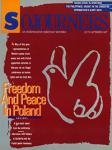We are often reminded by students of scripture that the biblical definition of peace, designated by the Hebrew word shalom, means a great deal more than the simple absence of military conflict or physical violence. Instead, shalom refers to an inclusive state of harmony and well-being between and among human beings, the rest of creation, and the Creator.
As such, shalom assumes, among other things, a peace between nations that is rooted in justice and in respect for the dignity of all peoples and persons. And the clear implication throughout scripture is that so long as injustice, oppression, and alienation persist, so will the accompanying curses of violence and bloodshed.
Those of us who seek to apply biblical faith to political realities have often done a good job of bringing this biblical understanding of peace to the questions before our country. We've pointed out the relationship between the mammoth U.S. military budget and the neglect of the poor among us. We've insisted that there can be no true, enduring peace in Central America until the long-standing wrongs of exploitation and dominance have been righted.
We've joined with the leaders of South Africa's majority in proclaiming that reconciliation between black and white can only come in partnership with the redistribution of political and economic power. Some of us even point out the futility of Middle East "peace" talks that ignore the issues of justice and self-determination for the Palestinians.
All of these claims are, for us, rooted in the biblical teaching that peace can only grow from relationships of justice and mutual respect. And in each case, our understanding of the biblical call has been enriched by listening to sisters and brothers living in the middle of those violent situations.
But when it comes to the conflict between the United States and the Soviet Union, our notion of peace has often seemed to shrink from the expansive biblical vision of human dignity and harmony to technocratic solutions for nuclear disarmament. Sometimes we've analyzed the origin and function of Cold War enmity and anti-communist ideology in the United States. But we've seemed reluctant to admit that oppression in the Soviet Union, especially Soviet occupation and dominance of its smaller neighbors, might have anything to do with the Cold War or the arms race it feeds.
Too often, regarding the U.S.-Soviet conflict, we've dealt mostly with symptoms, such as nuclear weapons competition, rather than political and economic causes on both sides. Too often we've failed to apply our own best ideas and visions to the single most dangerous conflict of our time.
THERE ARE, OF COURSE, understandable reasons for that blind spot in our world-view. Among those reasons, the undeniable horror presented by the threat of nuclear annihilation tops the list. The argument is often heard that all other issues are of secondary importance until nuclear weapons are eliminated. But, ultimately, the weapons themselves are not the core of the problem. They are only inanimate instruments of human violence and sin and can't be abolished simply by abstracting them from their context. If we truly want to eliminate the weapons and the threat they pose, we must also resolve the very human tangle of aggression, conflict, and oppression on both sides that creates them.
Many of us have also been reluctant to look closely at the Eastern side of the East-West conflict because we've feared giving more ammunition to those in our own country who are not the least bit shy about using human rights as a weapon of Cold War hostility. But ignoring the fact of Soviet oppression does not make it go away as a daily reality for its victims, or as a very real fear and concern among the American people. Instead of denying reality, we must take up the challenge of demonstrating that a commitment to peacemaking and disarmament can go hand in hand with a principled commitment to human rights and human dignity.
As noted earlier, in many situations of conflict in the Third World, our understanding has been enriched by the testimony of our counterparts on the scene. One of the factors that has helped stunt our understanding of East-West issues is the extreme difficulty of establishing communication with potential allies on the other side.
Those in the Soviet Union and the Soviet bloc who are brave enough to voice dissent from their governments' policies are generally forbidden to travel abroad. Western visitors to those countries have been discouraged, and sometimes prevented, from meeting with the so-called dissidents. As is noted elsewhere in this issue, we, and our counterparts in the East, are often held captive by the official propaganda mechanisms of both superpowers.
For all these reasons, we at Sojourners were excited when we were invited to send a representative to Warsaw, Poland, for a conference in May that was sponsored by the illegal Polish human rights group Freedom and Peace. In this issue we are happy to give our readers Polly Duncan's report from that conference on peace and human rights, as well as the first-person testimonies she gathered from spokespersons of Solidarity and Freedom and Peace.
At least since the birth of Solidarity in August 1980, the Polish struggle has been in the forefront of efforts to open up new possibilities within the Eastern bloc. The unsanctioned gathering of Western peace activists with Polish and other Eastern human rights and peace activists on Polish soil could represent at least the embryo of a very hopeful new alliance across Cold War lines. It represents the early stages of a convergence between those on both sides who refuse the false choices posed by both superpowers between disarmament and democracy, human rights and detente, or, as our Polish friends have it, freedom and peace.
Danny Duncan Collum is a Sojourners contributing editor.

Got something to say about what you're reading? We value your feedback!
